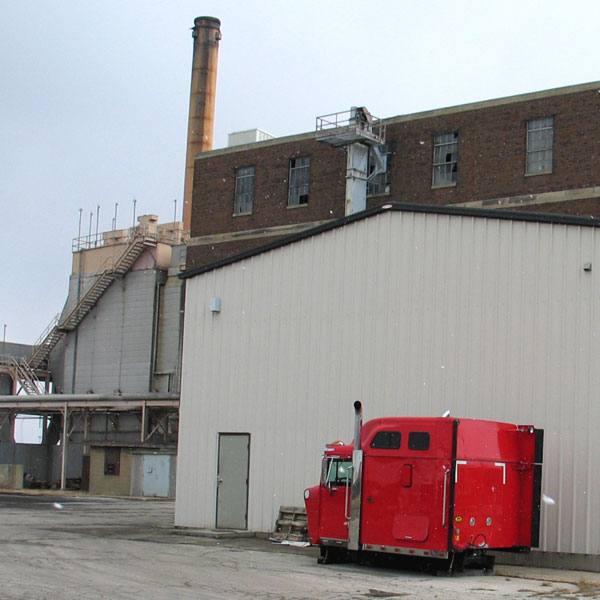
U.S. Census Bureau / Rantoul, Illinois
TerraServer / Aerial Photo
"The Missile Age Comes To Chanute: The 1960s and '70s"
In the 1960s Chanute became the prime training center for one of the most important missile programs in history, the LGM-30 Minuteman intercontinental ballistic missile. The Minuteman ICBM became a key missile deterrent against the Soviet Union for America and her western allies. Beginning in the late 1960s Chanute also trained thousands of allied airmen from Asia and the Middle East.
During the 1970s Chanute provided training for thousands of USAF airmen for service in Vietnam. The base invested heavily in quality-of-life programs, building new student dormitories and other support facilities. Due to the cessation of aircraft support requirements for Chanute's training mission, the Air Force closed the base's remaining active runway in 1971. In 1977, Chanute became the prime training center for the Air-Launched Cruise Missile (ALCM). The base was also involved in the Ground-Launched Cruise Missile (GLCM) and MX missile programs.
U.S. Environmental Protection Agency / NPL Site Narrative for Chanute Air Force Base
CHANUTE AIR FORCE BASE
Rantoul, Illinois
Federal Register Notice: December 1, 2000
Chanute Air Force Base (AFB) is located in the north-central portion of Champaign County in east-central Illinois. The main base covers 2,125 acres in the Village of Rantoul. A small stream, Salt Fork Creek, flows along the southern perimeter and directly through the southeastern corner of the base. The southeastern corner of the base is known as Operable Unit (OU) 2, which is the location of past waste disposal activities. The primary sources of hazardous substances within OU-2 include Landfills 1, 2, 3, and 4; Fire Training Areas (FTA) 1 and 2; and Buildings 916, 922, 927, 932, 975, and 995, which contained either oil-water separators, underground storage tanks (USTs), sludge pits, or a combination of those items. The primary mission of the base was to provide military and technical training for Air Force personnel and civilian employees and for other Department of Defense personnel. The training activities focused on operation and maintenance of military aircraft and ground support equipment.
Chanute AFB was constructed in 1917 and initially served as a pilot training facility and a storage depot for aircraft engines and paint. The base served as a training school for all Air Corps mechanics from 1922 to 1938. During World War II, technical training operations focused on aircraft maintenance and metal processing. Military flight operations were terminated at Chanute AFB in 1971, and base closure began in 1990 in response to an order issued by the Secretary of Defense. All military operations at the base ceased in September 1993, and portions of the base became available for commercial and other uses. The Air Force Base Conversion Agency (AFBCA) currently oversees the base closure.
Illinois Environmental Protection Agency

"Closing Bases Tough but Necessary"
Prepared statement of Joshua Gotbaum, assistant secretary of defense for economic security, to the Military Installations and Facilities Subcommittee, House National Security Committee, Feb. 23, 1995; followed by DoD's 1995 base closure and realignment recommendations, as of March 7, 1995.
As you all know, the size of our military force and our budget both have been shrinking. Unless we downsize our infrastructure as well, we run the risk that funds will be spent on infrastructure that ought to go to readiness and modernization -- in effect, that the tail would swallow the teeth.
Already the redevelopment of closed bases has created nearly 8,000 new jobs and over 200 tenant businesses. The types of reuse are as diverse as the communities themselves. England Air Force Base in Alexandria, La., and Chanute Air Force Base in Rantoul, Ill., have become the engines of their communities' economic growth by creating over 1,500 jobs on base in less than two years after closure. Today on those two former bases there are more civilians working than before the bases were closed.
"Economic Renewal: Community Reuse of Former Military Bases"
Chanute Air Force Base, Rantoul, IL (BRAC 88; closed Sep 93) – Today there are more than 70 industrial and commercial tenants on the property, occupying more than 1.3 million square feet of space. These businesses have created 1,416 new jobs, surpassing the level of civilian employment at the time of the closure announcement, and they produce more than $1.2 million in annual revenues. Major new businesses include Textron, a manufacturer of plastic automotive parts, and a microfilm processing and document storage facility. The newly established civilian airport met its tenth-year projections in just two years, and currently handles more than 700 air operations a month. And more than 900 families now occupy former base housing. One related initiative offers an innovative foster care program, a medical clinic, and housing for the elderly. In addition, the former base now provides 135 acres of parks and recreational opportunities.
In 1993, the Center for Strategic and International Studies published a study entitled, Forging a Military Youth Corps. That same year, Congress, acting upon the studies recommendations, provided funding in the 1993 Defense Authorization Act for the National Guard Bureau to conduct a pilot youth intervention program. The purpose of this pilot program was to determine if life coping skills and employability of a high school dropout could be significantly improved through participation in a life skills program using a military model.
Fifteen states became operational during the first five-year pilot period with Illinois chosen as one of the original pilot states. Currently, 25 states are operating Youth Challenge Programs. Illinois has the largest program with an annual target of 800 graduates. In May of 2001, the Illinois program's name was changed from Lincoln's ChalleNGe Program to Lincoln's ChalleNGe Academy.
The Lincoln's ChalleNGe Academy is currently on its 25th class and starting its twelth year of operation. The program has become immensely popular and has the potential of providing thousands of "at-risk" young men and women in Illinois with a new start.
Where traditional educational methods have failed, the Lincoln's ChalleNGe Academy has succeeded and proved to be a tremendous alternative for young people who have the ability to excel, but need an intensive, structured environment.
The graduates of the Lincoln's ChalleNGe Academy are disciplined and accomplished. They are on the road to becoming successful and contributing members of society and their community.
Lincoln's ChalleNGe is an investment in the future of Illinois communities. The cost to society without this program could be much greater if our youth are lost to unemployment, welfare, drugs, gangs or the judicial system. Current federal legislation provides a full time commitment to the Youth ChalleNGe Programs across the nation.

We’re a 200 family farm cooperative using one of the oldest forms of business organization to bring one of the newest, most sophisticated meat plants into production. Our members own and control every facet of the business –
- We raise the hogs
- We own the processing plant
- We are the governing board of directors
We are intensely committed to each step from farm to table. The decisions we make protect the quality of our pork, so you can be sure that Meadowbrook Farms is the freshest, safest, best-tasting pork you can serve.
We are based in the Midwest-- one of the best agricultural regions in the world. This means we have access to the highest quality feed and support for our hog farms. And we’ve brought some European flair to the heartland with a very specialized, state-of-the-art and small-scale plant production process.
This means our customers can buy the same prime cuts of meat farmers serve their own families. We also provide them with custom processing, private labeling, consistent portion control, value-added services and much more.
Farmer Members
Our members are successful, independent and business-savvy farmers who respect hard work, integrity, honesty and dedication. Our production knowledge mixes university training with tried and true on-farm experience. We’ve joined together as a cooperative to make our collective vision a reality and offer the finest pork products available anywhere.
"Working Practices and Future Plans"
The plant works on a two-shift system processing some 31,000 hogs per week (400 head of animals per hour). The facility is completely owned by the 200 members of the cooperative from Illinois, Iowa, Indiana and Wisconsin who can buy shares in the plant for $900 each. Each share entitles the member to have 50 animals slaughtered and processed per year. Members range from 200 to 50,000 head sold annually.
Once producers have committed to the project, they have an obligation to bring a certain number of hogs to the plant. Members must also maintain the co-op's carcass composition and pork quality standards, including minimal pale soft exudative pork and be Pork Quality Assurance Level III certified. A screening process, designed to randomly sample co-op member hogs for quality, has been ongoing since early 2004 and consulting veterinarians have examined herds to ensure animals meet health certification standards for some niche markets (organic, antibiotic-free, trichinae-free and products for ethnic communities).
The rendering products from the plant are produced at a specialist contract facility from animal carcass material transported from the plant. The plant contributes 0.8% of total US pork production, but mainly in the specialty products market. Only Trucker Quality Assurance (TQA) program graduates can transport the hogs. Producers are paid on the value of primal cuts, which delays their checks by 12 hours.
Future plans include expansion of the facility to increase processing capacity, and to produce fully-cooked pork products and products for the European market (the plant already meets European Union and ISO 9000 standards).
